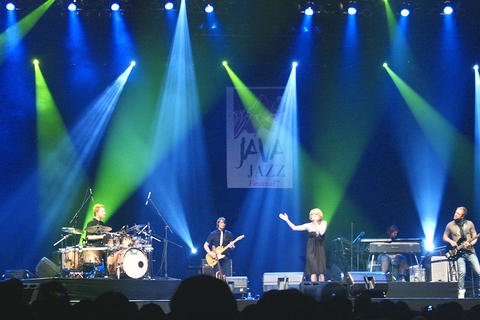Java conjures up steaming cups of strong coffee in the minds of many. After last week's Java Jazz Festival, it should be jazz.
The festival is the largest gathering of jazz musicians in the world, with over 1,000 performers. This year it included artists of almost every jazz sub-genre. Jazz virtuosos like Lee Ritenour, standard jazz vocalists like Kurt Elling, R 'n' B/Soul legends like Incognito, smooth jazz artists like Marc Antoine and even pop stars like Babyface, all made appearances..
When we - the bandmates and friends I was traveling with - arrived at the Jakarta Convention Center, there was already a huge crowd and a plethora of souvenir vendors. It looked like a rock concert rather than a jazz festival. At the door, we saw the members of a young jazz band playing with skill beyond their years - and that was just the outdoor stage.

PHOTO: COURTESY OF RICHARD LI
After entering the venue there was a problem: With 20 stages, how would we ever decide which act to watch? Luckily, we found out that legendary keyboardist Jeff Lorber was playing the opening act in the Exhibition Hall and ran to hear it like paparazzi after celebrities.
Over the three-day festival, for which we had purchased passes for US$100, we often had the same problem. We did get to see some great performances, though. Joe Sample and Steve Gadd were there. Incognito reunited with Maysa in a groovy act that had the audience up and dancing. Ex-Yellowjackets drummer William Kennedy backed up Lee Ritenour. Old comrades Melvin Davis and Patrice Rushen released a fusion of Latin and West Coast jazz. Besides these renowned international artists, there were also many Indonesian bands, most of which appeared to be quite young.
Taiwan's presence was felt when Taiwanese band SiZhuKong (絲竹空) performed. The band's combination of traditional Chinese ballads and modern jazz gave a fresh twist to traditional songs.
In between shows, we did some people watching. Not knowing the popularity of jazz music in Indonesia, we had thought most of the audience would be expats. In reality, the majority of participants appeared to be young, local people. We could see their enthusiasm for jazz, as many sang along with the performers. We were surprised by this passion for and acceptance of jazz music, which often takes second stage to pop idols in the hearts of the young.
The sound systems used throughout the event ensured that the music came out crystal clear. All of the audio-visual and broadcasting equipment, as well as the hardware and software, was operated by professional crews. The overall experience was like watching meticulously edited DVDs of live gigs with a 5.1 Dolby stereo. The professional staff of 1,000 ensured that everything ran smoothly.
In a cost-benefit analysis after the event, I found that this large-scale event barely turned any profit at all, but for those who went, the benefits were off the books.

It’s a good thing that 2025 is over. Yes, I fully expect we will look back on the year with nostalgia, once we have experienced this year and 2027. Traditionally at New Years much discourse is devoted to discussing what happened the previous year. Let’s have a look at what didn’t happen. Many bad things did not happen. The People’s Republic of China (PRC) did not attack Taiwan. We didn’t have a massive, destructive earthquake or drought. We didn’t have a major human pandemic. No widespread unemployment or other destructive social events. Nothing serious was done about Taiwan’s swelling birth rate catastrophe.

Words of the Year are not just interesting, they are telling. They are language and attitude barometers that measure what a country sees as important. The trending vocabulary around AI last year reveals a stark divergence in what each society notices and responds to the technological shift. For the Anglosphere it’s fatigue. For China it’s ambition. For Taiwan, it’s pragmatic vigilance. In Taiwan’s annual “representative character” vote, “recall” (罷) took the top spot with over 15,000 votes, followed closely by “scam” (詐). While “recall” speaks to the island’s partisan deadlock — a year defined by legislative recall campaigns and a public exhausted

In the 2010s, the Communist Party of China (CCP) began cracking down on Christian churches. Media reports said at the time that various versions of Protestant Christianity were likely the fastest growing religions in the People’s Republic of China (PRC). The crackdown was part of a campaign that in turn was part of a larger movement to bring religion under party control. For the Protestant churches, “the government’s aim has been to force all churches into the state-controlled organization,” according to a 2023 article in Christianity Today. That piece was centered on Wang Yi (王怡), the fiery, charismatic pastor of the

Hsu Pu-liao (許不了) never lived to see the premiere of his most successful film, The Clown and the Swan (小丑與天鵝, 1985). The movie, which starred Hsu, the “Taiwanese Charlie Chaplin,” outgrossed Jackie Chan’s Heart of Dragon (龍的心), earning NT$9.2 million at the local box office. Forty years after its premiere, the film has become the Taiwan Film and Audiovisual Institute’s (TFAI) 100th restoration. “It is the only one of Hsu’s films whose original negative survived,” says director Kevin Chu (朱延平), one of Taiwan’s most commercially successful